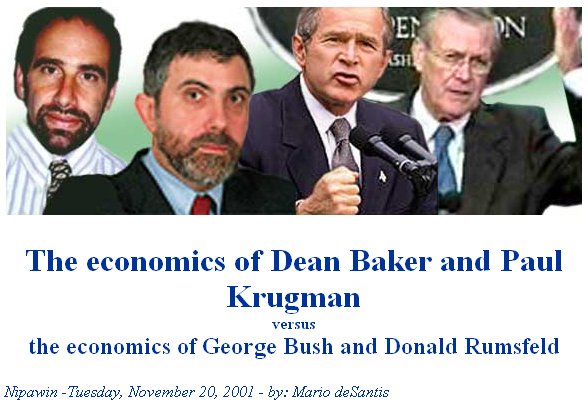Learning Stories
by
Mario deSantis
mariodesantis@hotmail.com
“I am a Canadian, free to speak without fear, free to worship in my own way, free to stand for what I think right, free to oppose what I believe wrong, and free to choose those who shall govern my country.” - -The Rt. Hon. John Diefenbaker, Canadian Bill of Rights, 1960
“The whole judicial system is at issue, it's worth more than one person.”--Serge Kujawa, Saskatchewan Crown Prosecutor, 1991
“The system is not more worth than one person's rights.”--Mario deSantis, 2002
Ensign Stories © Mario deSantis and Ensign
|
|
"General Pinochet [the Chilean dictator] has supported a fully free-market economy as a matter of principle. Chile is an economic miracle."--Milton Friedman, Nobel Laureate in Economics "I have seen no evidence in my 24 years in Congress of one instance where because of American military involvement with another military that the Americans have stopped that foreign army from carrying out atrocities against their own people."--Senator Tom Harkin (D-IA) Economist Dean Baker has found that the boom of the 90's was due to the illusionary wealth created by both the bubble in the stock market and by the undue consumption of foreign goods and services related to the U.S. foreign trade deficit. At the same time, economist Paul Krugman is telling the Bush administration that the country cannot sustain an economy based on high consumption of oil as the U.S. imports close to 50% of its domestic needs and as the price of oil is intrinsically affected by a pattern he calls the 'oil-hog cycle,' the hogs being the Arab sheiks, Texas millionaires and other people who don't need more money. Especially in the last 10 years, the U.S. Federal Reserve Board's monetary policies have had the effect to prop up the stock market and to further shift the wealth from the poor to the rich. And the continuation of the U.S. dependence on foreign oil has been the main reason for the U.S. to have its troops stationed in the Middle East. In order to partially correct the present economic anomalies Dean Baker has suggested the need to devaluate the U.S. dollar. This devaluation would eventually effect the balancing of the foreign trade deficit along with the opportunities for developing countries to buy more from the U.S. and have a fairer exchange of goods and services. In addition, Paul Krugman recommends that the Bush administration pursue an energy policy of conservation and diversification. But the economic reality is so much different from what Dean Baker and Paul Krugman are proposing, and in fact both President George Bush Jr. and Secretary of Defense Donald Rumsfeld are strong proponents of the Chicago School of Economics, the school which produced Nobel Laureate Milton Friedman and with this noble man the beginning of the Free Market and Corporate Globalization. President Bush is still tinkering with the idea to have his oil friends drill in the Arctic National Wildlife Refuge. And more importantly, in light of the present crisis of international terrorism, the Bush administration is pushing the vision of the Free Market by bringing wars and victories rather than to follow a vision of Fair Market by bringing peace and justice. And as the U.S. pushes the Free Market agenda of the transnational corporations so the U.S. defends this Free Market by beefing up its military power at home and abroad. The Free Market agenda supporting the property and intellectual rights of the transnational corporations will take care of the U.S. foreign trade deficit, and a foreign trade surplus will be created as more military exports will fatten the pockets of the few and privileged. The social and economic implications of the proliferation of arms and the hegemony of the U.S. can be appreciated by the following statistics: ***Pentagon expenditure were $295 billion in 2000, could hit $375 billion in 2001 and could reach $400 billion in 2002 ***The United States supplied arms or military technology to more than 92% of the conflicts under way in 1999 ***1999 world military expenditures topped $780 billion. While at the same time an estimated 1.3 billion people survive on less than the equivalent of U.S. $1 a day ***The U.S. share in world arms exports rose from 35% in 1990 to 54% in 1999 References The Chicago boys and the Chilean 'economic miracle.' Pinochet and Chile: Dedicated to Pinochet's victims around the world http://www.lakota.clara.net/myths/economy.html The Facts of militarization, Federation of American Scientists http://www.fas.org/asmp/fast_facts.htm THE NEW ECONOMY GOES BUST: WHAT THE RECORD SHOWS, by Dean Baker, October 29, 2001 http://www.cepr.net/new_economy_goes_bust.htm The Oil-Hog Cycle, by Paul Krugman, November 18, 2001, The New York Times http://www.nytimes.com/2001/11/18/opinion/18KRUG.html Recognize the link between oil, war, SEATTLE POST-INTELLIGENCER EDITORIAL BOARD, November 18, 2001 http://seattlep-i.nwsource.com/opinion/47010_energyed.shtml Runaway Pentagon spending will do more harm than good. The arms companies must be happy. By Frida Berrigan and William D. Hartung, October 23, 2001 http://www.progressive.org/pmp0701/pmpbo2301.html |
